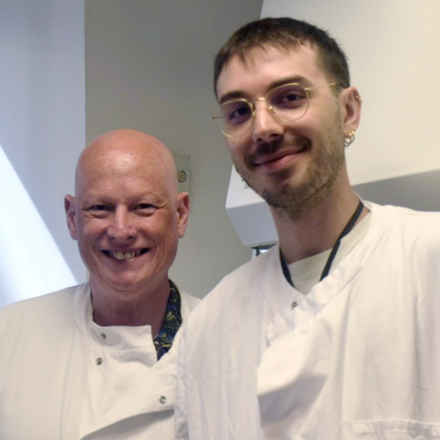‘We’re hoping our research can lead to potential treatments’
Posted: Wednesday 20 December 2023
A groundbreaking research project is underway, focusing on screening a library of already licensed drugs to potentially treat Stargardt disease.
The project, led by Mike Cheetham and his team at UCL, Institute of Ophthalmology will be looking specifically at the ABCA4 to see if they can find drugs to correct the mutations which cause Stargardt.
Some mutations in the ABCA4 protein cause it fold incorrectly and be removed from the cell. Without any ABCA4 protein the macula becomes damaged, which causes vision loss.
Drugs that can correct similar gene folding mutations have revolutionised the treatment of other conditions, including cystic fibrosis (CF). The team hope that this technology can help Stargardt disease patients too.
Mike said: “This has already transformed the life of CF patients. It has really changed the way we think about some of these things. And there are other examples of other conditions where you can use small molecules to rescue the misfolding of a faulty protein.”
Testing existing drugs
The team has already tested a small collection of drugs and discovered that rescuing ABCA4 is possible, now they want to screen more.
“Think of it like finding a perfect key for a lock. What we're looking for is the right key to fit the ABCA4 lock, ” added Mike.
“We started by using drugs that were known to affect similar proteins, but because it’s a specific lock we need to find the key for we need to screen many drugs. The idea is that once we find a potential drug, we can use similar drugs, based on their structure or action to see if they can improve the effect. We are starting with a couple of changes in ABCA4 but we will also test other ABCA4 changes to see if they can also be rescued.”
The team has a model retina in a dish made from stem cells that they will use to test the new drugs. They made these models using gene editing techniques to make specific changes in these cells, thereby changing the ABCA4 gene to have the same changes as those found in patients.
“It's like giving the mini retina in the dish some genetic instructions,” Mike said. “It's a way to understand and treat eye problems without experimenting on real people.”
A treatment for Stargardt
Mike highlighted that developments in research up to this point have led them to the exciting stage where they can look forward to new ways of treating Stargardt disease.
He said: “ We're at an exciting time for retinal disease. There’s so much technological advancement in terms of what we can do in the lab now, from gene editing to stem cells and making little mini retinas in a dish. All these techniques have really advanced what we can do in terms of developing and testing drugs.
Mike said he wanted to do this project about 10 to 15 years ago, but I couldn't persuade anyone to fund it. Now, thanks to Macular Society donors funding a post-doctoral fellow Dr Davide Piccolo Mike has been able to progress the research.
He added “Now we found the right time to do it.
“People are working on different aspects of the disease, trying to find different solutions. I think in the last five to ten years, we've seen such an advance in our understanding of the genetics. We've known about the ABCA4 gene for 20 years. And now much better at finding the genetic causes.”
Hopes for the future
Talking about his hopes for the future, Mike said: “There's still a lot of unanswered questions and there's so much we can do to try and understand more. In some ways, it can seem we’ve got a long way to go, but at the same time, we're hoping that directly from this research we can translate our understanding into potential treatments.”
Mike’s post-doc Dr Davide Piccolo also shared his hopes for the project: “I think for me, this project is the perfect example that we’re now moving towards personalised medicine, and we can have a treatment for each specific defect that single patients have. I would really like to see this in my future.”

